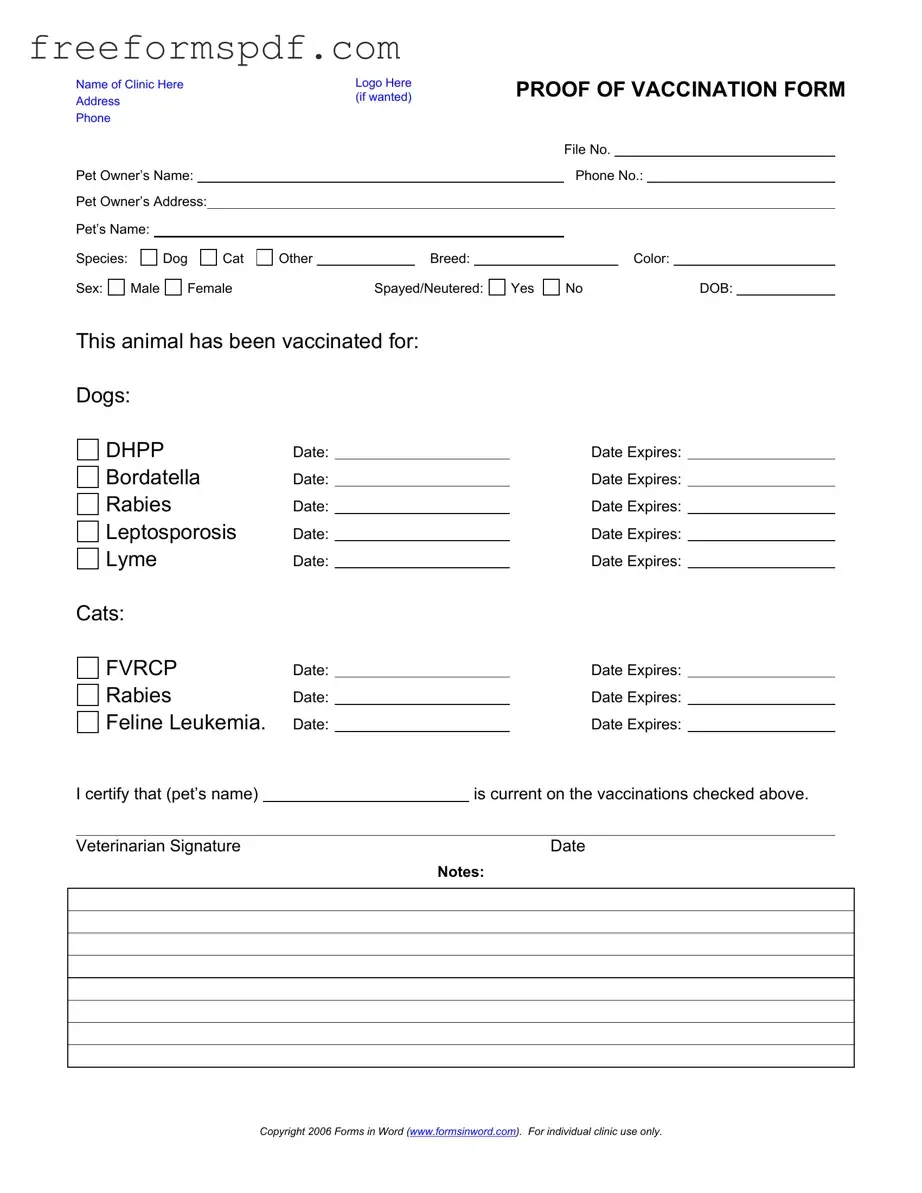Fill in a Valid Proof Of Vaccination Dog Template
Common mistakes
-
Leaving Out Essential Information: Many people forget to fill in critical details such as the Pet Owner’s Name, Pet’s Name, or Breed. This can lead to confusion and delays in processing the form.
-
Incorrect Dates: It's common to miswrite vaccination dates or expiration dates. Double-checking these dates ensures that the information is accurate and up-to-date.
-
Not Specifying the Species: Some individuals overlook the importance of indicating whether the pet is a dog, cat, or other species. This detail is crucial for proper documentation.
-
Missing Veterinarian Signature: A signature from the veterinarian is necessary to validate the form. Failing to include this can render the form invalid.
-
Forgetting to Check Vaccination Status: Ensure that all relevant vaccinations are checked off. Omitting any vaccinations can lead to issues with compliance.
Learn More on This Form
-
What is the Proof of Vaccination Dog form?
The Proof of Vaccination Dog form is a document that verifies a dog has received its required vaccinations. It includes details such as the pet owner's information, the dog's details, and a list of vaccinations administered.
-
Why do I need this form?
This form is often required by boarding facilities, dog parks, and some pet insurance companies. It serves as proof that your dog is up to date on vaccinations, which helps protect both your pet and others.
-
What information is included in the form?
The form includes the pet owner's name, contact information, the dog's name, breed, color, sex, date of birth, and a list of vaccinations with their respective dates and expiration dates.
-
How do I obtain this form?
You can obtain the Proof of Vaccination Dog form from your veterinarian. They will complete the form during your dog's vaccination appointment.
-
What vaccinations are typically listed on the form?
Common vaccinations for dogs include DHPP, Bordetella, Rabies, Leptospirosis, and Lyme disease. The specific vaccinations may vary based on your dog's health needs and local regulations.
-
What does it mean if my dog is spayed or neutered?
Spaying refers to the surgical procedure for female dogs, while neutering is for males. Indicating whether your dog is spayed or neutered can be important for certain facilities and insurance policies.
-
How often do vaccinations need to be updated?
The frequency of vaccinations varies by type. Some, like Rabies, may need to be updated every one to three years, while others may require annual boosters. Always consult your veterinarian for specific recommendations.
-
What should I do if my dog is not current on vaccinations?
If your dog is not current, schedule an appointment with your veterinarian to get the necessary vaccinations. Once completed, request a new Proof of Vaccination form.
-
Is there a fee for obtaining the form?
Generally, there is no separate fee for the form itself; however, you may incur costs for the vaccinations. Check with your veterinarian for specific pricing.
-
Can I use this form for multiple dogs?
This form is typically designed for one pet at a time. If you have multiple dogs, you will need a separate Proof of Vaccination form for each one.
Misconceptions
Understanding the Proof of Vaccination Dog form is essential for pet owners. However, several misconceptions can lead to confusion. Here are ten common myths about this important document:
- It is only necessary for travel. Many believe the Proof of Vaccination form is only required for traveling with their pets. In reality, it is often needed for boarding, grooming, and even some dog parks.
- All vaccines are listed on the form. Some people think that the form includes every vaccine available. However, it typically covers the most common vaccinations required for dogs.
- Once vaccinated, a dog never needs another shot. A common misconception is that vaccinations are a one-time event. Dogs require booster shots to maintain immunity, which is noted on the form.
- Any veterinarian can fill out the form. Many assume that any vet can provide a proof of vaccination. Only licensed veterinarians who have administered the vaccines can sign the form.
- The form is the same for all pets. Some think that the form is universal for all animals. In fact, there are different forms for dogs and cats, reflecting their specific vaccination needs.
- Vaccination dates are not important. Many pet owners overlook the importance of vaccination dates. The dates indicate when the vaccines were given and when they expire, which is crucial for maintaining your pet's health.
- Proof of vaccination is not legally binding. Some believe that the form has no legal standing. In many situations, it serves as legal proof of compliance with local vaccination laws.
- Once a dog is vaccinated, they are immune to all diseases. A common misunderstanding is that vaccination guarantees immunity. While vaccines significantly reduce the risk of disease, they do not provide absolute protection.
- The form is only for dogs. Some think this form applies only to dogs. However, there are similar forms for cats and other pets, each tailored to their vaccination requirements.
- It can be filled out by the pet owner. Many pet owners believe they can complete the form themselves. However, it must be signed by a veterinarian to be valid.
Being informed about these misconceptions helps ensure that pet owners have the correct documentation for their furry friends. Accurate records are vital for their health and well-being.
Browse More Forms
How Old Can My Car Be for Lyft - Completing this form is a requirement for all Lyft drivers.
To understand the process involved in submitting a necessary Homeschool Letter of Intent documentation, it is important for parents to familiarize themselves with the required details and compliance aspects outlined by the state. This ensures that they meet educational guidelines effectively, paving the way for a successful homeschooling journey.
Roof Estimate Sample - Request follow-up discussions to address further inquiries.
